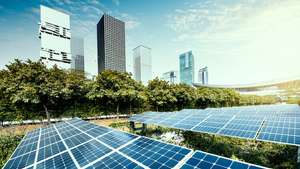
Normative-methodical base of the use of biofuels in Ukraine.
 Rostyslav Sipakov 1*
Rostyslav Sipakov 1*
1Kyiv National University of Construction and Architecture, Povitroflotskyi Avenue, 31, Kyiv, 03680, Ukraine
Received: 08/01/2018, Accepted: 08/20/2018, Available online: 09/30/2018.
DOI: https://doi.org/10.32557/useful-1-1-2017-0002
HDL: http://hdl.handle.net/20.500.12334/25
*Corresponding author: e-mail: r.sipakov@icloud.com
Under a creative commons license. Volume 1, Issue 1, 2017, pages: 13-20.
Author Keywords: biofuels, bioenergy, alternative fuels, energy, energy crops, laws, regulations.
Abstract. In Ukraine there is a large number of documents aimed at the development of the biofuels sector. The article analyzes the regulatory and legal framework for the development of biofuel energy in Ukraine, outlines ways to increase it. It has been established that, according to many experts, the regulatory and legislative framework is currently imperfect; there are no corresponding programs or set of activities and finances. The main problem is that even existing laws, programs and decisions are systematically not implemented, first of all by the authorities.
- Introduction
In Ukraine today, the need of oil and petroleum products is provided by suppliers in 80- 90 percent covered by imports. The seasonal increase in prices for diesel fuel caused by performing field work and leads to an increase in the cost of production of agricultural products. In addition, the use of petroleum products as fuel for internal combustion engines has a negative impact on the ecological environment. Therefore, in conditions of significant dependence on the import of oil and gas and environmental problems of energy production, Ukraine needs to switch to the use of alternative sources of fuel and energy that would not depend on external supplies of raw materials. One of the ways to solve this problem is to develop biofuel production.
Today, the share of biofuels in the energy balance of the country is negligible. The main reason for this is the imperfect system of State management on the organization of production of biofuels. Among the reasons hindering the development of its production, it should be noted that the lack of effective use of land for the cultivation of raw materials, low investment attraction, accounting and quality control, the attraction of scientific developments, etc.
Thus, in today's conditions for Ukraine, the issue of energy independence is extremely topical and has a significant impact on the economic and political situation in the country.
Analysis of recent research. Many scientists are interested in bioenergy issues in Ukraine, among which should be highlighted the research by A.M. Varchenko, G.A. Goluba I.V. Goncharuk, M.I. Kobets and others. Despite some study of bioenergy, some problems remain unresolved.
The purpose of the article - studying the directions of energy efficiency improvement, determining the degree of influence of political reforms in the field of energy saving; analysis of the regulatory and legal basis for the production and use of biofuels; assessment of biofuel production opportunities in Ukraine.
- Presentation of the main material of the study
Bioenergy in Ukraine has a wide range of raw materials, as well as a technological and industrial base for the development of industry for the production of biodiesel, bioethanol, biogas, and heat.
According to the "Concept of the State Target Scientific and Technical Program for the Production and Use of Biological Fuels," the share of biofuels in the overall balance of the country should increase to 5-7 percent [1]. But the volume of necessary funding (about 7.5 billion UAH) and possible sources of their revenues, mainly due to state and local budgets, raise some doubts as to the reality of implementation of these plans. In addition, there are warnings regarding the expansion of the use of certain types of biofuels associated with the possible reduction of crop area of food crops, insufficient quality of motor biofuels, increased levels of carbon dioxide emissions, etc.
In order to solve energy problems, Western politics and business are strengthening the integration processes in the field of energy supply of the needs of the economy and social and cultural sphere on a single organizational and legal basis.
The main instruments governing the new energy policy of the EU are the Energy Charter and the Energy Charter Treaty. These documents pursued such strategic goals as enhancing EU energy security, increasing the competitiveness of the Alliance's economies, preventing monopolistic pressure from energy exporters to importers, improving the environment, reducing energy prices. The documents defined the general rules of functioning of the internal market of electricity and gas, which relied on the unity of legal instruments, the transparency of the activities of companies in the energy market, free access to new participants, and the prevention of monopolization.
The development of the EU energy policy is carried out by all the EU governing bodies, but the European Commission plays a leading role. Specific benchmarks for the EU in the field of energy have become the task of reducing energy supply by 13 percent by 2020, Bringing the share of renewable energy sources to 20 percent, and reducing carbon emissions by 20 percent. All that force most developed countries to look for environmentally friendly, alternative non-traditional and renewable energy sources (NRES) [2].
Biofuels currently plays a dominant role among other NRES, forming about 46 percent of the market, can provide heat, electricity and various gaseous (biogas), liquid (bioethanol, biodiesel) and solid fuel. [Google Translate > Ukrainian to English]
Biomass processing technologies also allow us to solve the problem of utilization of harmful domestic and industrial wastes, to obtain as by-products: high-quality fertilizers, building, and other useful materials. More than 150 types of growing plants that are capable of producing oils in the world are a chance that allows the regions to solve their regional energy problems independently at the local level.
The European Commission believes that in 2020, one fifth of energy will be produced from environmentally friendly sources. Experts predict that biomass potential will increase: In 2020 - from 215 to 239 million tons; in 2030 - from 243 to 361 million tonnes. [3] of these, the largest percentage in the future it will be energy crops.
Today in the EU countries more than 10 million MWh of electricity and about 10 MGH of thermal energy is annually received at the expense of biogas. Biogas technology leaders are the following countries: Germany, Great Britain, USA, Canada, Brazil, Denmark, China, India, and others.
With regard to the production and consumption of liquid biofuels for cars, about 90 percent of all production in the EU of this type of fuel falls into three countries - Germany, France, and Italy. Biofuels for automobiles are made from corn, rapeseed, soy, with stems of sugar cane. Brazil uses sugar cane for the production of these alcohols, and corn as biofuel is grown in the United States [4].
In the European Union, biodiesel began to be manufactured in 1992. More than 215 biodiesel plants with an average total capacity of 16 million tonnes per year were built in Europe.
Judging by the experience of European countries, implementation of biofuel production meets with a number of raw, technological, economic and technical difficulties.
The regulation of these issues in the European Union is carried out through:
- Directives on state support for biofuel market;
- standards that regulate the quality of biofuels;
- government funding of research and research-innovative work on promoting the development of biofuels;
- state support for the construction of biofuel plants.
The regulatory framework for the use of biodiesel and biofuels in the European Union uses the following legal acts:
- Directive 2003/30/EC of the European Parliament and of the Council of 8 May 2003 on the promotion of the use of biofuels or other renewable fuels for transport is targeting EU Member States to increase the use of alternative fuels.
- Green Paper of the European Commission “On the European Energy Security Strategy”.
In Europe, diesel biofuels are produced in two principal schemes: "French" and "German" [5]. The "French" scheme involves the production of diesel biofuels at centralized plants with a capacity of more than 10 thousand tons per year. In Germany, there are currently more than 15 centralized and about 100 decentralized plants producing diesel biofuels. The "German" scheme is more acceptable to the current state of the Ukrainian economy.
In the European Union, biodiesel production has substantial state support. For example, in Germany it is not subject to mineral and environmental taxes, there is a rapeseed subsidizing system, in France, the tax deduction is € 0.35 / liter.
Industrial use in the energy sector of Ukraine has the following types of biofuels: biomass, which is used by direct burning in boilers; biogas can be obtained from manure, at solid household waste landfills and by anaerobic digestion, as well as bioethanol and diesel biofuels.
In addition to the production of biodiesel and bioethanol, the development of the sales infrastructure of these types of motor fuels is of great importance. All conditions for the production, use, and sale of biodiesel fuel of European quality are created in Ukraine. Standard DSTU 4840:2007 Provides for the certification of diesel fuel with a 5 percent impurity (B5) of Esters of methyl fatty acids (EMFA). In 2010 in Ukraine introduced a national standard ISO 6081: 2009 "Motor fuel. Methyl esters of fatty acids, oils, and fats for diesel engines. Specifications". This standard complies with European standards EN 14214:2003 «Fuel for vehicles. Methyl esters of fatty acids for diesel engines. Requirements and methods of analysis» [6]. But a significant disadvantage is the poor performance of these standards.
Attempts to stimulate the development of alternative energy (including biofuel production) in Ukraine began almost since it became independent.
In 2000, the Law "On Alternative Liquid and Gas Fuels" (No. 391-XIV) was adopted in Ukraine, which defined the main principles of state policy in the field of the use of alternative fuels, and also provided support to projects for the use of biogenerator gas and liquid fuels from biomass, but there were no specific financial mechanisms for such support.
In 2003, the Verkhovna Rada adopted the Law No. 555-IV "On Alternative Energy Sources". In 2006, the State Program for the Development of Biodiesel Production for the Period until 2010 was approved. It was planned to build nearly 20 plants producing biodiesel from 5 to 100 thousand tons per year. This would make it possible to produce not less than 623 thousand tons of biodiesel annually.
The Cabinet of Ministers of Ukraine also adopted the Ordinance No. 145 of 15.03.2006 "On Approval of the Energy Strategy of Ukraine for the Period until 2030". In the Law of Ukraine of 16 March 2007 No. 760-V "On Amending Certain Legislative Acts of Ukraine Regarding the Stimulation of Energy Saving Measures", there are levers provided that stimulate the implementation of measures for the production and use of biofuels, in particular: by 1 January 2014, the zero rate of excise duty on the share of fuel, which is a biocomponent in mixed types of motor fuel is set; by 1 January 2019, the supplies and equipment necessary for the production of biofuels exempted from value added tax. "The Concept of the State Target Scientific and Technical Program for the Development of Production and Use of Biological Fuels" was approved by the Ordinance of the Cabinet of Ministers of Ukraine dated 12.02.2009 No. 276-p.
The respective amendments and additions to the laws "On Alternative Liquid and Gas Fuels", "On Entrepreneurship", "On the Uniform Customs Tariff", "On the Customs Tariff of Ukraine", "On Enterprise Profit Taxation" and others were made.
In the agrarian sector - the development of normative documentation (state standards harmonized with the EU standards) on the production and use of diesel biofuels was started; pilot lines (low power) for the production of diesel biofuels were manufactured and tested; Measures are taken to strengthen the raw material base by expanding the areas of rape cultivation [7].
In Ukraine, considerable work is under way on the implementation of EU legislation on the protection and preservation of the natural environment (more than 200 Environmental Directives - regulations, decisions, and strategies).
Strengthening of state regulation in the national sphere of the environment through the transfer and implementation of EU environmental legislation, as well as control over its compliance, are the key and most difficult issues related to the EU's eastward expansion [8].
Implementation of the EU legislation on the protection and preservation of the natural environment will reduce the losses of the national economy from adverse environmental factors. It can be assumed that the introduction of European normative acts and directives in Ukraine (the total number of which exceeds 400) will allow, as calculations show, to reduce losses of its economy from unfavorable environmental factors by 5-7 percent. In this case, Ukraine's loss of GDP from negative environmental conditions is not 10-15 percent, as today, but 5-7 percent, which will enable an increase in the state's GDP by 60-80 billion UAH.
It should be noted that some experts have big doubts about the environmental benefits of biofuels. So, crops used for biofuel production have limitations in crop rotation. For example, corn is one of the worst predecessors in crop rotation. After it, there is little moisture in the earth, and the cost of herbicides and insecticides for its cultivation is the largest among cereals. It is precisely corn treated with increased soil erosion. There are also some difficulties with increasing the availability of rape crop rotations. According to the opinion of the Nobel laureate in the field of chemistry, Paul Krutzen, the cultivation of most crops used by the US and the EU to produce biofuels stimulates global warming. This is due to the use of methods of industrial agriculture, which involve the active use of fertilizers, resulting in the release of nitrogen oxides that give rise to the greenhouse effect. According to experts, regardless of how effective, for example, sugar cane for the production of ethanol, its benefits are offset if we take into account the destruction of tropical forests to increase its area of crops. Because of this, the volume of "harmful" СО2 in the atmosphere only increases [9].
The main problems hampering the use of biological fuels in Ukraine are the following:
- Lack of a clear development strategy that would take into account all factors of the impact of ensuring energy and food security, ensuring a growing demand for motor fuel and preserving the fertility of agricultural land;
- lack of a balanced system of legal, regulatory and other market instruments that would allow for effective economic activity in the field of production and consumption of biofuels;
- insufficient development of the infrastructure for storage and sale of liquid biofuels;
- the lack of effective control over the quality of biofuels at all stages of its production and implementation;
- unfavorable conditions for the attraction of investments, including foreign ones (political instability, corruption, etc.);
- the low level of implementation of the adopted decisions and normative-legislative acts at all levels of government.
The main steps to implement the policy of reform and achieve positive results are:
- improvement of legislation on issues of production and use of biofuels on the basis of economic and financial incentives;
- development of a unique system of codes for bioethanol and diesel biofuels with the EU Member States, which will facilitate implementation of import-export operations;
- development of the latest technologies and implementation of innovative developments of biofuel production;
- conducting scientific research on the development of technologies for growing rape for various climatic zones of Ukraine;
- production and testing of biofuel production lines;
- Organization in the regions of the country of organizational work related to the construction of production facilities for the production of biofuels;
- replacement of boilers operating on natural gas, fuel oil and coal, energy efficient boilers and heat generators working on biofuels;
- assistance in the construction of facilities for the production of biogas, diesel biofuels, bioethanol, as well as the conversion of part of the food and processing industry enterprises to biofuel production.
Conclusions
Thus, the development of the country's biofuel energy sector has its advantages, but for its success, it is necessary to solve a number of problems and to take into account possible side negative factors in order to reduce their impact.
Bioenergy development statistics in the EU Member States indicate that the development of this industry can be a rather promising direction for Ukraine and become a significant source of energy for domestic consumption.
Ukraine has adopted a sufficiently large number of documents aimed at solving the biofuel segment development problem, but, according to many experts, the regulatory and legislative framework is currently imperfect, not backed by appropriate programs, a set of measures and finances. The main problem remains that even existing laws, programs, and decisions are systematically not implemented, first of all by the authorities.
The development of the biofuel segment, along with the development of other types of NRES, will enable Ukraine to reduce the energy dependence of the country and take certain steps to harmonize energy production with environmental protection.
Existing potential allows us to develop in Ukraine production of the following main types of biofuels, such as liquid types of motor fuel (biodiesel and bioethanol), biogas from the processing of agricultural production waste and other organic waste, biomass for the production of heat.
In Ukraine, there are conditions for the production and sale of motor biofuels: free areas for growing grain, oil and special "energy" crops, scientific, technical and personnel potential for biofuel production, growing domestic demand for motor biofuel, and a large export market. All this allows you to quickly increase the capacity from its production to acceptable (optimal) levels.
References
[1] “Innovative-investment and technological security of the transformation of regional economic systems”: monogr.; [For co. Ed. Acad. NAAS of Ukraine MA Hvesik] - K .: Naukova Dumka, 2016.
[2] Ursul A.D., Ursul T.A. “Ecology, security, development: theoretical and methodological problems”. - Geopolitics and security. - 2011. - No. 3.
[3] “Scientific fundamentals of the national strategy of sustainable development of Ukraine”; [For sciences. Ed. Acad. NAAS of Ukraine, doctor of sciences, prof. M.A. Hvesik] - K.: DU IEPSP NAS of Ukraine, 2013.
[4] Cherevko G. “Agroholdings as new organizational forms of large-scale business in agribusiness of Ukraine”. - Agrarian Economics. - 2015 - T. 5. - No. 12.
[5] “National Paradigm of Sustainable Development of Ukraine”; [For co. Ed. Acad. NAS of Ukraine, Dr. Sci. B.E. Paton]. - K.: DU IEPSP NAS of Ukraine, 2012.
[6] Zaika S.O. “Institutional Principles of Bioenergy Development in Ukraine”. - Scientific Bulletin of LNUWMBT after Gzhytsky - 2012. - T. 16. - No. 1 (58), P. 1. - P. 189 - 194
[6] “Evaluation of MOBILE vehicle emission model”. — FHWA-PD-94-38, Federal highway administration environmental analysis division/office of environment and planning, December, 1994. — 204 p.
[7] Kulyk R. R. “Problems of the formation of environmental audit in Ukraine”. - Business Inform. - 2011. - № 4. - pp. 153 - 155.
[8] Sidorovich V. “World Energy Revolution: How renewable energy sources will change our world”. - Moscow: Alpina Publisher, 2015. – p. 208.
[9] E. G. Gasho, V. S. Puzakov, M. V. Stepanova. “Peculiarities of implementation of energy saving policy in the regions: analytical collection”. - Moscow: Analytical Center. - 2012. – p. 62.
Please cite as: R.Sipakov “Normative-methodical base of the use of biofuels in Ukraine.” USEFUL online journal, vol. 1, no. 1, pp. 13–20, September 2017. DOI: https://doi.org/10.32557/useful-1-1-2017-0002








Comments